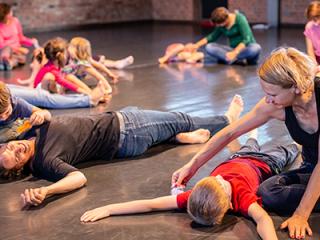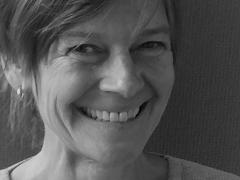
- Info event
CARE // somatic childhood pedagogy
To support babies, children and adolescents individually and competently in their developmental process according to their needs is the goal of the CARE - training in somatic childhood education.
CARE stands for the following contents: Creativity- Attachment- Resilience- Education. Caring and Care work brings with it the responsibility to support the potential of each individual to unfold. In 200 units and 6 modules, the training conveys a comprehensive understanding of the importance of human movement development from embryological development to teenage years in practice and theory.
In movement we learn and develop. The first language we speak is non-verbal, is the language of movement. These non-verbal experiences form the basis for all further developmental processes.
This info evening begins with a short practical session and then opens the space for content-related and practical questions about the training CARE and allows a personal acquaintance with one of the lecturers.
This event is free of charge. Please follow the link to register for this online event via zoom. Thank you, we are really looking forward to meet you. Questions and curiosity are very welcome!
Zoom-link for this info event: CARE // somatic childhood pedagogy
Ausführliche Seminarinformationen
200 UE / 6 modules / 4 somatic methods / 3 instructors
This innovative training combines several somatic methods (IBMT; BMC®, INPP, Feldenkrais, Cranio-Sacral Osteopathy, Experiential Anatomy, Authentic Movement) with the latest theory and research on child development. A somatic approach can provide effective and simple support for babies, children and adolescents who are facing challenges in learning, development or emotional regulation, whether big or small. This programme will support you to integrate somatic approaches into your practice, providing a combination of body awareness and embodiment training with practical somatic exercises and approaches appropriate to specific client groups.
Who is this training suitable for?
The training offers a comprehensive professional development programme suitable for those working with babies, children and young people in a range of education and health care contexts. It is relevant to educators, social workers, midwives, doulas, physiotherapists , paediatric nurses, doctors , teachers, psychologists and no medical practitioners in the field of dance, music and theatre provision for children.
Traning Structure:
This is a 200 hour training programm organised into 6 modules.
Training Goals:
- Familiarity with the fundamentals of child development
- The ability to recognise the profound interconnections between the nonverbal and verbal dimensions of consciousness
- A somatic and theoretical understanding of the ongoing development and learning processes
- An understanding of the interpersonal emotional exchange of the development process and how to support it in relationship
- Knowledge of the psycho-physical processes of learning
- An understanding of Brain development
- The ability to recognise different developmental aspects of the different client groups
- The ability to integrate somatic approaches and methods into working with children
- An understanding of the Importance and fundamentals of communication with parents and carers
- Skills to recognise developmental and learning challenges within their client group.
Once qualified you will:
- Be able to develop playful-somatic movement programs for different age groups, which support their development.
- Be familiar with"preverbal language” and able to playfully integrate childhood movement development and reflexes in a variety of contexts
- Be able to recognise and understand the presence of persistent primitive reflexes and be able to implement strategies to address this.
- Be able to recognise compensatory behaviours in your client group
- Be able to identify and develop support possibilities for development and learning difficulties / blockages
- Create an appreciative, appreciative and attentive atmosphere as a place of learning and playing
Graduation Requirements:
- Proof of 10 hours observation.
- One class presentation
- Case study or practical research, documented in an essay of maximum 3,000
Applied somatic methods of training:
- IBMT (Integrative Bodywork- and Movement Therapy)
- Neurophysiological Psychology
- Feldenkrais
- Contact Improvisation
- Ideokinesis
- Body-Mind Centering®
- Dance
General content:
Embryology- Tone
- Development of the vestibular system
- Reflexes
- Primitive reflexes
- Postural reflexes
- Human Movement Development
- Brain development
- development of the nervous system
- information processing
- physiological learning processes
- new versus re-learning
- creating a supportive space for learning
- dealing with resistance
- achievement evaluation
- age-appropriate mediation
- teenagers
- 8-11 (development of sexuality)
- 3-7/8 (Postural reflexes should be integrated)
- 0-3
- Games: Movement activities / Support / Touch
- Touch: as support not as correction /alternatives to touch
Subjects:
- Experiential Anatomy
- A variety of Somatic methods
- Context / practical application / practice fields
- Integration
- Hands on
- Case study discussions
Seminarleiter*innen

Ka Rustler
Ka Rustler has been performing, researching and analyzing somatic practices and their embodiment in movement, choreography and therapy for over 30 years. BMC® Teacher
Daten & Kosten
Anmeldeinformationen
Online
This event is free of charge. Please follow the link to register for this online event via zoom. Thank you, we are really looking forward to meet you. Questions and curiosity are very welcome!
Zoom-link for this info event: CARE // somatic childhood pedagogy
